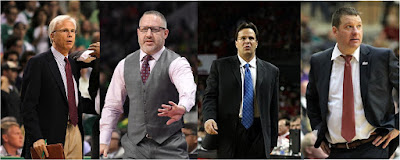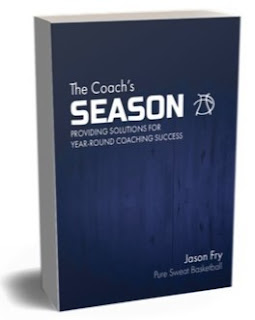Going into our game with Texas a week ago, I wasn't pleased with our defense. We were missing the buy-in and the commitment needed to sustain a good defensive effort that makes up a good defensive team. After a few days (and nights) of thought, I came to the conclusion that I'd fallen short in teaching the "why" -- concentrating only on the how and what of defensive play. So a few days before heading to Austin we sat the team down and addressed them on "Why Defense Is Important." Here are some notes from that talk:
TELL ME WHY DEFENSE IS IMPORTANT...
◄Most will tell me what is important about defense
◄But why is defense important
DEFENSE REVEALS WHO YOU ARE AS A PERSON (not a basketball player)
◄It speaks to your character
◄Who you are at your core
IT’S A MINDSET BEFORE IT’S A SKILLSET
We can see your strengths
◄Not physically...not your foot quickness...not your speed...not your length
We can see your weaknesses
◄Not how slow you are...not how small you are
Strengths of a person COMMITTED TO PLAYING DEFENSE
◄Grit & Determination - “I’m going to own this possession.”
◄Mental Toughness - they have an ability succeed through failure
Lasor focus...they were where their feet are
“Clear the mechanism” — “What train?”
◄Physical Toughness - they don’t rest or take plays off
◄Warrior Mentality - Inflict their will on their opponent
◄Heart of a Competitor
Finding a Way to Win - Stu Aberdeen: Surgeon, Lawyer
Weaknesses that are on display of a poor defensive player
◄Mentally Soft - can’t handle momentary failure and set back
•Not an NBA player - Living in the Past
•Egg and a Tennis Ball
•Unable or unwilling to concentrate
◄Lack of Physical Toughness - not tough enough to play minor pains
◄Fear - or work, or competition, of failure
◄Laziness - doesn’t like the work involved
◄Lack of Empathy - just doesn’t care
We also get a lot into you own SELF-DISCIPLINE
◄What you do when no one’s watching (helpside for example)
◄What you do when no one cares (fans, media, late game, etc.)
◄Preparation (scouting report, video)
•Not talking about the minimum
•Kobe (...everyone want’s to be the beast)
◄Understands Practice in regard to preparation & habits
We can see your INTERNAL VALUE SYSTEM...what’s truly important to you
◄Players that Defend care about WINNING
◄Players that Defend care about COMPETING
◄Players that Defend care about TRADITION - those before them
◄Players that Defend care about their TEAMMATES
It’s the NOBILITY OF DOING SOMETHING FOR THE RIGHT REASONS
◄No glory in defense — no headlines or awards
◄It’s the DISCIPLINE OF DOING IT FOR THE RIGHT REASONS
Defense is not just about what kind of basketball player you are but what kind of person you currently are and want to be.
Many will tell you defense starts with heart — it doesn’t. It starts with your brain. It’s your brain that makes all the decisions. It’s your brain that transmit signals to your legs, your arms, your lungs and yes, your heart. Bottom line? Being a good defensive player is a choice — being a tough person is a choice — being a disciplined person is a choice. Being a successful person is a choice.
It’s never a matter of heart — it’s a matter or desire...do you want to?...do you want to bad enough? It’s a decision...it’s a choice.
IT’S NOT OUR ABILITIES THAT DEFINE US, BUT OUR CHOICES?
Who you are is who you are! It’s not a part-time job...if you defend well part of the time you’re not a good defender...if you prepare part of the time, you’re not preparing at all.
NOW THE MOST IMPORTANT QUESTION IS WHERE
DO YOU FALL IN ALL OF THIS AND IS IT IMPORTANT
ENOUGH FOR YOU TO IMPROVE OR CHANGE?












